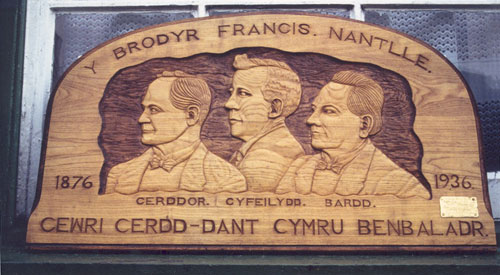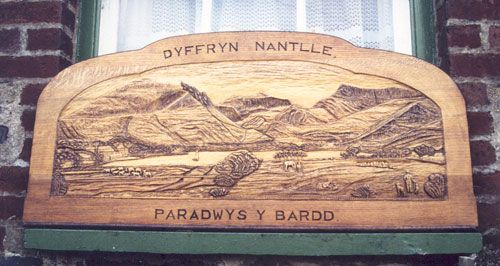Cerdd
Dant & The Francis Brothers
“In the twentieth century,
there was more consistent activity in the field of
Cerdd Dant in Dyffyn Nantlle than was seen in any other
part of the old county of Caernarfonshire,” said Dr
Aled Lloyd Davies in his book “Canrif o Gân II”.
The
chief exponents of it in the 20th century were the
Francis Brothers, Llyfni Hughes and Gwennie Roberts.
In
our time (the late 20th- early 21st century), Carys
Puw, Glesni Jones and Parti Lleu maintain the
tradition.
What is Cerdd Dant?
Cerdd Dant (literally
“String Music”) also known as Canu Penillion (literally
“Verse Singing”) is a musical form unique to Wales.
Nowadays it has various
agreed rules and conventions, but in its early mode
of performance (put very simply) the harpist would
start first with a traditional tune, then the singer
improvised a counter-melody with familiar verses beginning
on an off-beat: both voice and instrument had to finish
together.
Although its origins are
uncertain, by Victorian times it came to be considered
as rather vulgar and uncultured in polite society,
and for a short time it was banned from the National
Eisteddfod (our chief festival of the arts.) See www.historic-uk.com/HistoryUK/Wales-History/Eisteddfod.htm  for further details. for further details.
But there were individuals
such as the Francis Brothers who strove hard to rescue
it from oblivion and to restore its reputation as a
most expressive combination of Voice and Verse. They
lived to see the establishment of the Cerdd Dant Society
in 1934 (for more information see www.cerdd-dant.org  ). ).
The Francis Brothers
Griffith William Francis
(1876-1936) and Owen William Francis (1879-1936) were
two brothers from Cwm Pennant.
The family moved to Clogwyn Brwnt, Drws-y-Coed,
thence to Gelliffrydiau and thereafter to Nantlle Village.
They
sang all over Wales and in the principal cities of
England where halls and chapels would be full. They
took part in the earliest Welsh Language radio broadcasts
- these were from Dublin in March 1927.
They were
notable for their popularisation of the poetical
works of Eifion Wyn, Crwys, R. Williams
Parry and others
and according to
Dr Aled Lloyd Davies there are grounds to believe
that their performances were the earliest examples
of penillion
duet singing in Wales. 

Dyffryn Nantlle: The Bard's Paradise
|